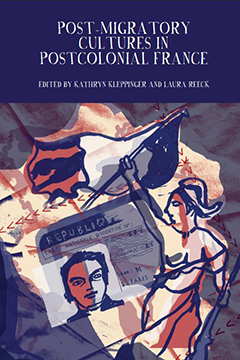
Post-Migratory Cultures in Postcolonial
France
With Post-Migratory Cultures in Postcolonial France, editors Kathryn Kleppinger and Laura Reeck present a skillfully crafted investigation of French post-migratory postcolonial minorities’ influence on French national identity and contemporary cultural production. Post-Migratory Cultures convenes esteemed contributors for diverse and fascinating discussions of hip hop, laïcité, literature, and more. Experts qualify the book as “excellent,” “intelligent,” and “illuminating.” To commemorate their book launch, Kleppinger and Reeck reflected on their editorial journey:
"One major concern that this volume raises is the failure of French media and policymakers to acknowledge the full complexity of France’s contemporary social demographics. Too often the population we have called post-migratory postcolonial minorities (postcolonial second and third generations) continues to be seen as ‘immigrants’ or ‘foreigners’ who need to be ‘integrated’ into the nation, when they have in fact been raised within the contours of French Republic. With this book, we have attempted to move beyond paradigms and discussions of immigration and migration to anchor all of the cultural producers very squarely in France where they participate in the present and future of France as French citizens. With this participation, of course, they bring a range of questions, concerns, doubts, and hopes specific to the legacy of French colonialism and the future of the Republic as ‘colorblind’ and ‘une et indivisible’ [one and indivisible].
We also address gaps in scholarship by moving resolutely toward examining what about the 21st century will make it distinctive, and what events, occurrences, and conversations in this contemporary history will mark cultural production. All of the cultural production featured in our volume occupies the space between the conceptual categories used in literary and cultural studies of ‘French’ (for Metropolitan France) and ‘Francophone’ (for French-language production from outside France). And, within the literary series that the volume was published in, this book is the first to focus exclusively on France as a postcolonial space.
In editing the essays in this volume, we were surprised by the depth and obviousness of the convergences that emerged across graphic novels, rap, literary pamphlets, new media, and visual art—especially regarding post-memory, the weaknesses of institutions/institutional memory, the diversification of banlieue identities, Blackness, and Islamophobia. The unique stubbornness of the literary establishment in France to recognize and consecrate certain forms of authorship and certain authors tout court proved equally surprising. By contrast, other platforms and venues, such as the dance stage, seem more inclined to inclusivity.
Importantly, particularly for French policymakers, this volume identifies that using institutionalized social vocabulary in France to speak about differences within immigrant communities is insufficient. Different social realities are too often homogenized, and people of color are too often stripped of their difference. ‘Issu(e) de la diversité’ [of ‘diverse’ heritage] is also insufficient terminology in that it homogenizes different forms of diversity and continues to perpetuate the paradox of people being at once highly visible and invisible.
More generally, this work indicates that the most inventive, innovative, forward-looking cultural producers in France are post-migratory postcolonial minorities. They bring a complexified view of France and Frenchness to their art and activism. As French society continues to work through forms of postcoloniality, these cultural producers will play an important part in giving expression to and taking a stand on inclusion, access, and respect for differences."
Kathryn Kleppinger, GW Associate Professor of Francophone Studies and International Affairs
Laura Reeck, Allegheny College Professor of French and International Studies, and Lyle and Mary Biehler Chair in Modern Languages

